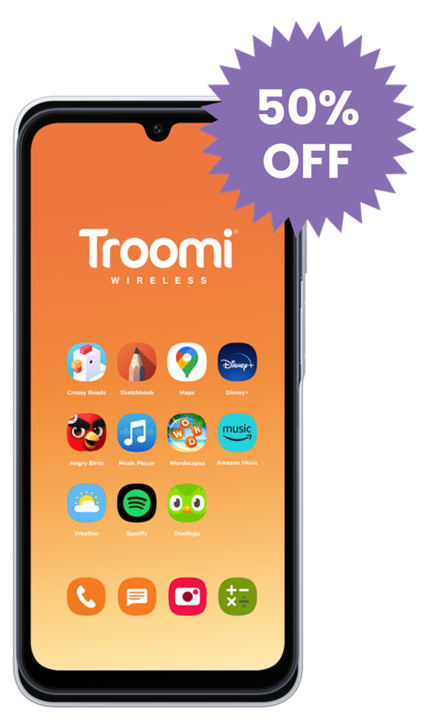How often do your kids use technology?
In today’s world, most kids use tech daily—and it’s easy to see why. Tech devices like smartphones help kids stay connected with faraway family, play online video games with friends, and answer nearly any question in seconds. Some classrooms have even gone digital (much to many a teacher’s chagrin). In fact, NPR reports that children 8 and under spend an average of 2.25 hours a day staring at screens. That sounds like a lot, but the average amount of time kids spend on tech only increases as they get older.
Tech has a plethora of amazing advantages, but spending too much time plugged in can be detrimental to a child’s mental and physical health. The Child Mind Institute reports that “overuse has a negative impact on [a teen’s] self-esteem and satisfaction with their lives.”
Social media sites, for example, may encourage kids to compare themselves to their peers. Studies show that online comparison culture may contribute to lower self-esteem and, in the worst cases, depression and anxiety. This is why smartphones from Troomi Wireless remove social media altogether!
So what should kids and teens do when technology is getting them down?
It’s simple: take a break.
Why Should Kids Unplug from Technology?
Here’s the big question: why do kids need to try unplugging from technology? After all, technology can benefit kids in many ways by increasing creativity, helping develop stronger connections with friends and family, and making it easier to connect with the international world (to name a few!).
Too much of a good thing can be harmful, however, and tech is no exception. Here are some benefits of unplugging from technology:
Kids focus better without technology. Level with me here: how often does your phone distract you from completing a simple task like laundry? If you’re like me, it happens all the time. We’re not alone, though—kids go through the same thing. Tech is distracting. Unplugging gives kids the time they need to focus on things they really enjoy, whether that be extra math homework, watercolor art, or running around the backyard with their siblings.
Tech ruins sleep. Did you know that screens ruin sleep? Most screens, including TV screens and smartphone displays, emit blue light. This bright light tricks a child’s body into thinking it’s earlier than it is, messing up their circadian rhythm and making it more difficult for them to get restful sleep. If your child turns their phone off at least an hour before bedtime (if not earlier), their sleep will be healthier, deeper, and more consistent.
Unplugging from tech boosts kids’ mental health. It’s no secret that social media isn’t the best for mental health. Kids that use social media may fall victim to comparison culture, cyberbullies, and FOMO. Among the many benefits of unplugging from social media are better focus, improved mental health, and increased self-esteem.
It’s easier to be mindful without tech. A child’s life can be pretty stressful. Taking some time between school and soccer to practice mindfulness, however, has been proven to lessen a child’s stress and anxiety. When a child unplugs from tech, they’re able to practice mindfulness and focus on the present moment free from distraction.
Tips for Unplugging from Technology
Taking a break from tech is easier said than done. I’ve tried so many times to put my phone away, only to find it back in my hand within the hour. If your kids struggle to separate themselves from their screens, here are some tips that might help them unplug:
- Help your child find a hobby. Often, kids spend so much time with technology because they want to avoid boredom. While they could fill their time with TikTok and League of Legends, we don’t recommend it. Instead, encourage your kids to find a hobby! If your child is interested in art, help them learn how to paint. If they like birds, show them how to use a pair of birdwatching binoculars. Hobbies are so diverse, and there’s bound to be something out there for everyone.
- Turn off notifications. Loud push notifications are the frontline killers of focus. When kids are hard at work on a book report, one push notification is all it takes to get their brain out of the zone and into the phone. Encourage them to turn off both phone and web push notifications so they aren’t tempted to check their phone every five seconds.
- Set up technology free zones. One of the best ways to help your child unplug is to designate areas of your house as technology-free zones. When anyone is in these areas (and that includes you!), they have to remain unplugged and off the phone. Try doing this in family spaces like the backyard or at the dinner table!
- Remove addicting apps. Apps like social media and video games are made to be addicting. Their content is always changing, giving kids reasons to keep coming back. Try removing addicting apps to inspire your kids to build real-life connections. You could also check out Troomi! Smartphones from Troomi Wireless are made with your child’s wellbeing in mind. Troomi removes addicting social media apps and gives parents the ability to set time limits on other apps. Check out our mission here!
- Spend more time outside. Ah, the great outdoors. There’s nothing more revitalizing than putting away the phone, stepping outside, and taking a deep breath of fresh air. Encourage your kids to switch off the screen and join you for some quality time outside.
- Read the literature. If you’re still struggling to help your child disconnect, seek some help from the experts. There are hundreds of books on unplugging from technology that could help you and your kids better understand how and why it’s important to unplug. Check out this booklist from Penguin Random House for some recommendations!
Put Down the Phone and Go Play!
Here at Troomi, we’re technology lovers—not haters. After all, devices like smartphones bring so much ease and creativity to the table. That’s why we believe in helping kids develop an appropriate and healthy relationship with technology.
Sometimes, however, that relationship requires a break. Unplugging from technology helps kids focus, sleep better, stay mindful, and improve their mental health. So instead of spending time with tech, encourage your kids to pick up a paintbrush, stare at the stars, or bury their nose in a book. They’ll thank you later.


